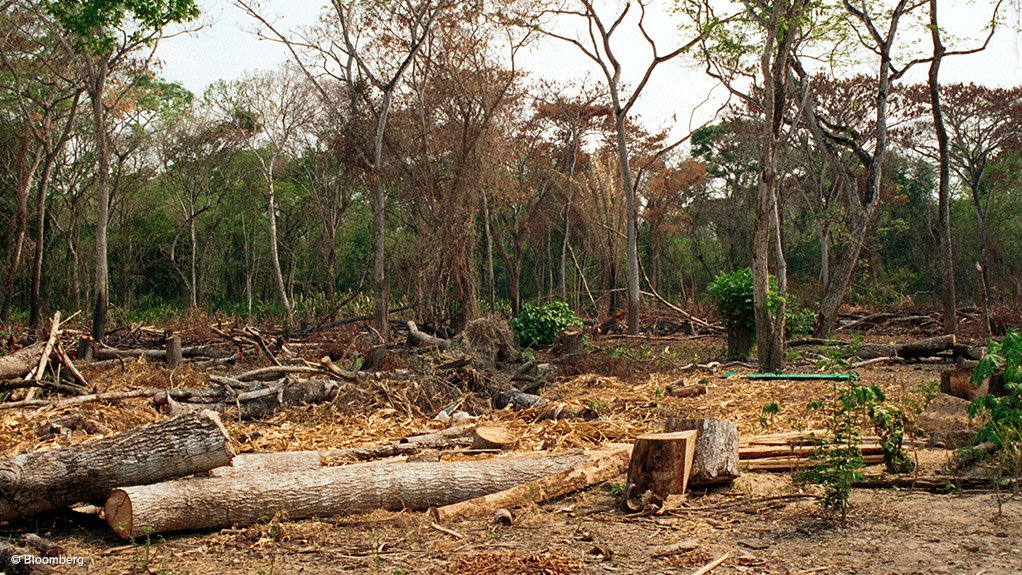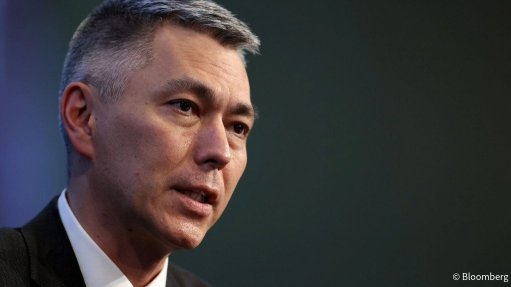Experts, indigenous peoples’ leaders call for ethical practices in meeting critical minerals demand


Increased mining of critical minerals is contributing to deforestation and threatening the rights of indigenous people
Photo by Bloomberg
Experts and indigenous peoples’ leaders have called for an end to rights abuses and environmental destruction driven by the growing global demand for critical minerals.
In a briefing on April 30, held ahead of the Organisation for Economic Cooperation and Development (OECD) Forum on Responsible Mineral Supply Chains, in Paris, this week, speakers pointed out that increased mining of nickel, lithium, cobalt, copper and other resources deemed ‘critical minerals’ is contributing to deforestation and threatening the rights of indigenous people.
The briefing was co-hosted by Securing Indigenous Peoples’ Rights in the Green Economy (SIRGE), a coalition of indigenous leaders, indigenous-led and allied organisations, as well as Fern, a European environmental nonprofit.
Critical minerals demand is expected to reach three-billion tons by 2050. This burgeoning demand is often attributed to the transition to a low-carbon economy; however, weapons manufacturing and other military activities are increasingly important drivers, with severe repercussions for indigenous people globally, SIRGE and Fern stated.
“The same minerals essential for wind turbines and electric vehicles (EVs) are being pulled into weapons systems used in active conflict zones. This isn’t just a diversion of resources – it’s a distortion of priorities.
“By allowing defence contractors to absorb minerals under the pretext of national security, we are undermining climate goals, prolonging wars and exposing entire populations, especially indigenous peoples, to intergenerational harm,” Klinger University of Delaware Geography and Spatial Sciences associate professor Dr Julie Klinger said.
“We urgently need policies that stop treating weapons manufacturing as an unquestionable public good and start asking whether our mineral supply chains are fuelling war or building a liveable future,” she emphasised.
Klinger also pointed out that there were no measures in place to ensure mines were opened under the guise of supplying the just energy transition actually undertake this, with materials untraced and very likely to end up in military use, especially given the industry’s size and economic power.
She also mentioned that existing conflict mineral legislation, including the OECD’s, had a “very narrow” definition of conflict. This was focused solely on the point of mineral extraction, aiming to prevent profiting or allowing mineral extraction to enrich illegitimate armed actors, and did not specify prevent the use of minerals to fund and enable armed conflict beyond sites of extraction.
Speakers emphasised the need for urgent, systemic changes, with robust protection for indigenous peoples’ rights, better environmental regulations and policy innovation to curb overall mineral consumption.
They also stressed the role indigenous peoples play in safeguarding nature, as well as the importance of recognising indigenous peoples’ land rights. The latter was a means of engendering environmental sustainability, as well as ensuring economic sense, as violating these could put mining operations at risk, SIRGE executive director Galina Angarova explained.
“The global economy’s insatiable appetite for minerals is devastating indigenous peoples, destroying ecosystems and perpetuating the injustices of extractive colonialism. Indigenous peoples will never stop defending their territories.
“Companies that violate our rights can face millions in unexpected costs and months or years of delays in projects. Mining companies must respect the rights of indigenous peoples. They literally can’t afford to ignore us,” she asserted.
STUDY
The briefing also presented key findings from a new study, ‘Driving change, not deforestation: How Europe could mitigate the negative impacts of its transport transition’.
Commissioned by Fern and Rainforest Foundation Norway, the study by French and Austrian researchers was released on May 7, during the OECD Forum.
This is the first time a report models the potential deforestation fuelled by future demand for EVs in the EU through to 2050.
The EU’s yearly metal demand for EVs is expected to reach 24.5-million tonnes by 2030 before decreasing owing to the longer lifespans of EVs.
The study shows that the minerals needed to power the EU’s demand for EVs will considerably impact on the world’s forests and communities of indigenous peoples, unless policymakers urgently change course.
The report finds that a business-as-usual scenario, relying on batteries composed mostly of minerals extracted from the soil of carbon-rich ecosystems, would cause the destruction of 118 000 ha of forests, equating to 18 football fields of forest vanishing daily for the next 25 years.
However, the study also shows mitigation measures to avoid this scenario. The authors identify two main ways to limit the deforestation risk linked to future demand for EVs in the EU – the adoption of battery technology and new mobility measures that would reduce demand for transition minerals, and smarter sourcing strategies.
The study was carried out by researchers from the French think tank négaWatt, which has modelled demand for metals and minerals in the transport sector, and the Vienna University of Economics and Business (WU Vienna), which translated the scenarios to reveal the resulting deforestation that would occur in the countries most affected by such mining.
The researchers propose an alternative pathway for the EU’s EV sector. Named the CLEVER scenario – which includes shared mobility, smaller vehicle sizes and reduced passenger kilometres – it would decrease projected deforestation by an estimated 82%, from 118 000 ha to 21 300 ha.
This scenario relies on a switch to more innovative lithium-iron-phosphate (LFP) batteries, which use iron and phosphate, instead of lithium-nickel-manganese-cobalt oxide (NMC 811) batteries, which are currently most used for the EU’s EVs, and which rely heavily on nickel and cobalt.
The CLEVER scenario is also based on policy measures that would contribute considerably to reducing the transport sectors’ mineral needs by up to 43% for copper and cobalt compared with the business-as-usual scenario.
Batteries account for about 70% of the deforestation footprint of EVs, while the manufacture of vehicle bodies is responsible for the remaining 30%.
The study evaluates direct deforestation caused by the expansion of areas for mining iron, bauxite, copper, manganese, nickel and cobalt.
The study authors state that mining also contributes to indirect deforestation far beyond the immediate mining site, as a result of the growth of surrounding settlements and the construction of infrastructure to meet the need for energy and transportation.
Academics from WU Vienna have found that more responsible sourcing strategies could further reduce the deforestation impact. Concretely, this means prioritising sourcing from countries with a particularly low level of historic deforestation.
Indonesia and Brazil were identified as deforestation hotspots throughout the scenarios.
Three sourcing scenarios were analysed. First, a ‘Basecase’ Scenario, where metal sourcing follows historical trends; second, a ‘Forest at Risk’ Scenario with a higher share of metals from countries with high deforestation intensities, increasing deforestation risks by up to 266%; and third, ‘Forest and Peoples Protection' Scenario prioritising sourcing from low-deforestation countries, which could reduce impacts by up to 41%.
During the briefing, Aranã Caboclo Indigenous community member and writer Djalma Ramalho Gonçalves pointed out that Paris has the largest fleet of EVs in Europe.
“All of them rely on lithium batteries, and a large part of this lithium is extracted from Brazil, Chile, Bolivia and more countries with violations of human rights and destruction of ecosystems.
“Lithium mining in my home region has been turned into a sacrifice zone for Europe’s EV transition. Every EV car is powered by Indigenous blood. We are not opposed to technology or development – we are opposed to a predatory model that violates rights and destroys the land,” Gonçalves stressed.
Article Enquiry
Email Article
Save Article
Feedback
To advertise email advertising@creamermedia.co.za or click here
Press Office
Announcements
What's On
Subscribe to improve your user experience...
Option 1 (equivalent of R125 a month):
Receive a weekly copy of Creamer Media's Engineering News & Mining Weekly magazine
(print copy for those in South Africa and e-magazine for those outside of South Africa)
Receive daily email newsletters
Access to full search results
Access archive of magazine back copies
Access to Projects in Progress
Access to ONE Research Report of your choice in PDF format
Option 2 (equivalent of R375 a month):
All benefits from Option 1
PLUS
Access to Creamer Media's Research Channel Africa for ALL Research Reports, in PDF format, on various industrial and mining sectors
including Electricity; Water; Energy Transition; Hydrogen; Roads, Rail and Ports; Coal; Gold; Platinum; Battery Metals; etc.
Already a subscriber?
Forgotten your password?
Receive weekly copy of Creamer Media's Engineering News & Mining Weekly magazine (print copy for those in South Africa and e-magazine for those outside of South Africa)
➕
Recieve daily email newsletters
➕
Access to full search results
➕
Access archive of magazine back copies
➕
Access to Projects in Progress
➕
Access to ONE Research Report of your choice in PDF format
RESEARCH CHANNEL AFRICA
R4500 (equivalent of R375 a month)
SUBSCRIBEAll benefits from Option 1
➕
Access to Creamer Media's Research Channel Africa for ALL Research Reports on various industrial and mining sectors, in PDF format, including on:
Electricity
➕
Water
➕
Energy Transition
➕
Hydrogen
➕
Roads, Rail and Ports
➕
Coal
➕
Gold
➕
Platinum
➕
Battery Metals
➕
etc.
Receive all benefits from Option 1 or Option 2 delivered to numerous people at your company
➕
Multiple User names and Passwords for simultaneous log-ins
➕
Intranet integration access to all in your organisation



















